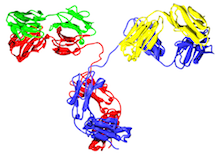Immune 'traffic jam' from viral infection interferes with therapeutic antibodies

Several drugs now used to treat cancer and autoimmune diseases are actually repurposed tools derived from the immune system. One of the ways these "therapeutic antibodies" work is to grab onto malignant or inflammatory cells and escort them to their doom.
Emory researchers have found that in a mouse model of chronic viral infection, a kind of traffic pileup inside the body limits how effective therapeutic antibodies can be.
The results, published this week in Immunity, have implications for biotechnology researchers who continue to refine antibodies for therapeutic purposes, as well as bolster our understanding of how chronic viral infections impair the immune system.
Researchers led by Rafi Ahmed, PhD, director of the Emory Vaccine Center, were studying mice infected by LCMV (lymphocytic choriomeningitis virus). They injected several antibodies with the goal of removing various types of immune cells from the mice. One end of the antibody molecule is supposed to bind the target cell, while another acts as a flag for other cells to get rid of the target cell.
However, during a chronic LCMV infection, the mouse's immune system is producing its own antibodies against the virus, which form complexes with viral proteins. These immune complexes prevented the injected antibodies from having the effect the scientists wanted, which was to deplete their target cells.
Excessive amounts of immune complexes appear to be "clogging" the Fc gamma receptors that immune cells would use to grab the antibodies bound to the target cell, says postdoctoral fellow Andreas Wieland, PhD, first author of the Immunity paper. That these immune complexes form was not news; but how much they interfere with other antibodies was, Wieland says. Fc gamma receptors were already known to be important for antibodies to be effective against influenza and HIV.
Just the presence of a LCMV infection or high antibody levels alone were not enough for the "clogging" effect – both virus and antiviral antibodies had to be present and form immune complexes.
To test relevance for a therapeutic antibody used clinically, the researchers examined rituximab, which was the first FDA-approved monoclonal antibody for treatment of B cell non-Hodgkin lymphomas. Rituximab has improved the survival rates of cancer patients, but a number fail to respond to treatment due to mostly unknown reasons. Using mice that express human CD20, the target antigen of rituximab on B cells, the researchers showed that excessive immune complex formation during chronic LCMV infection also interfered with the ability of rituximab to deplete target cells.
More information: "Antibody Effector Functions Mediated by Fcγ-Receptors Are Compromised during Persistent Viral Infection" DOI: dx.doi.org/10.1016/j.immuni.2015.01.009




















